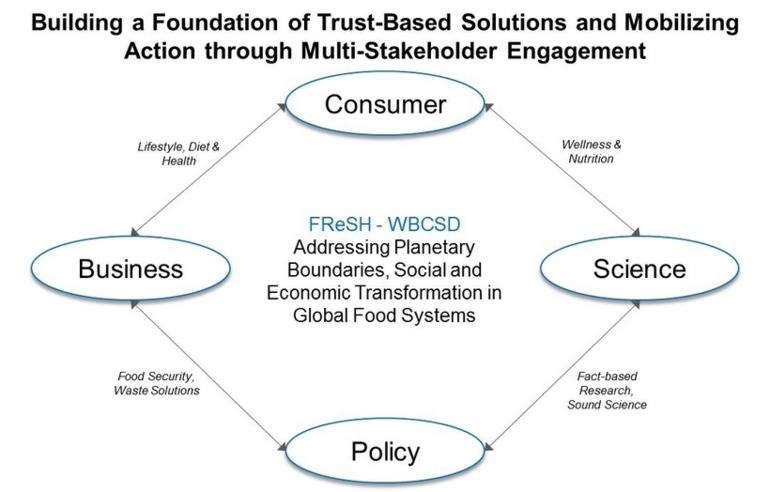Authors
Mark Coleman
Late last month I caught-up with Mr. Bakker to discuss some of the priorities he and the WBCSD are focusing on for 2017.
With so much political and social change happening around the world, particularly in the U.S., Russia, Europe and Latin America, our conversation began with a reflection on the Paris climate agreement. We spoke about President Trump’s denial of climate science and his opposition to the Paris accord. Mr. Bakker’s of the opinion that although the geo-politics of climate policy are shifting and colliding like ice sheets in the North Atlantic, he is hopeful that the intent, scale and impact of the climate agreement will endure.
Mr. Bakker pointed out that the foundation of the Paris Agreement is strong and the ratification was successfully negotiated because of three critical elements:
1. The science of climate change was clear and compelling.
2. For the first time in the Conference of Parties (COP) history, the meeting was opened to both state and non-state actors including representatives of civil society and cities.
3. Business came to the floor of the meeting with real solutions and a willingness to implement those solutions.
Mr. Bakker remarked, “Corporate leaders understand the material risks impacting the future competitive position of their business. Science-based facts and realities on climate change are very much a top-of-mind concern for global businesses, particularly those with integrated supply chains. For business, there are long-term implications for inaction on climate science. Global business leaders are managing both near-and-long term risk of their enterprise. Regardless of geopolitical wrangling, businesses are pushing forward to better their infrastructure, create jobs, launch new business models and technologies, and manage risk more intelligently.”
In 2015, with 70 global partners and 150 businesses, WBCSD launched the Low Carbon Technology Partnerships Initiative (LCTPi). Guided by a common agenda and framework for action, the LCTPi initiative has the potential to reduce emissions by 65% of the amount needed for the world to stay on a 2 degree pathway; and stimulate $5-10 trillion in global investment toward low-carbon economy solutions including low carbon freight, renewables, carbon capture and storage, energy efficiency, forests, smart agriculture, chemicals, and transportation fuels. It has been projected that 5-to-10 million direct and 15-to-35 million indirect jobs could be supported by LCTPi investments.
While some governments will continue to debate and cloud the reality of climate science, other market actors, notably civil society and business, are stepping up to create lasting change. WBCSD has and continues to serve as a guiding force and facilitator of this proactive mobilization of people and resources.
Our conversation turned to food. Mr. Bakker briefed me on the new WBCSD initiative, FReSH, which stands for Food Reform for Sustainability and Health. Through FReSH, WBCSD seeks to “accelerate transformational change in global food systems, to reach healthy, enjoyable diets for all, that are produced responsibly within planetary boundaries.”
Much like its work to bring business leaders together to address climate change under LCTPi, WBCSD and the EAT Foundation have initiated FReSH to bridge the business and research communities, to create a science-based framework and derive mutual, high-impact solutions in global food systems.
all sustainability issues are complex and interrelated. You can talk about the big picture, but unless you translate what the science is telling us into solutions, you have a hard time getting all stakeholders engaged
Based upon their learning from positive engagements like LCTPi and the Paris Agreement, the WBCSD team is extending its framework for stakeholder engagement and public-private partnerships forward to leading edge initiatives including FReSH. However, while their model of proactive engagement has demonstrated prior success, Mr. Bakker is mindful of some of the differences related to food systems.
Bakker notes, “Food systems are more complex than climate. Collectively, the understanding of our food systems is less mature. The science (and translation of science) on food systems is not yet conclusive. From land-use to personal health (diet) impacts, the integrated science of food is not as robust as climate-science has evolved to be. COP 21, for example, represents more than 20 years of global engagement and coordination on climate change. One has to ask, where is the COP for food? It currently doesn’t exist.”
From this context the EAT Foundation and WBCSD joined forces to create a “conference of parties” for food – and toward accelerating “transformation of healthy and sustainable global food systems.”
We live in a world of paradox. There are more than 1.6 billion overweight people in the world of which >500 million are obese. Today, nearly $240 million will be spent on obesity related diseases and >$80 million on weight loss programs in the U.S. alone. Although food is over-consumed by some, a significant portion of the world’s population lives in poverty and at severe risk of malnutrition. Nearly 14,000 people die each day from hunger. According to the United Nations, about one-third of the food produced in the world for human consumption is lost or wasted. In total, more than $1 trillion in food losses occur each year. WBCSD puts this paradox bluntly, “While a child dies from hunger every six seconds, the global weight-loss industry generates $200 billion in revenue every year.”
The WBCSD and EAT Foundation partnership is working to change this. Nearly 100% of the food consumed in the world is produced and supplied by small and large businesses. As such, as part of its initial strategy, WBCSD has engaged and partnered with 25 global corporations (including Unilever, Google, Kellogg’s, Bayer, DSM, Nestle, Syngenta, DuPont, Danone, Solvay and others), to take a “Fork to Farm” perspective on how food systems can be healthier, localized, and more sustainable.
To date, the WBCSD team has mapped out the value chain of stakeholders engaged in global food systems and discovered that the landscape is fragmented and that there is limited collaboration. WBCSD found that some organizations focus their efforts exclusively on human health or obesity, others on agriculture productivity and emissions, and yet others on poverty and nutrition. Their gap analysis exercise led the WBCSD team to structure the FReSH initiative by first bringing together more than 30 leading scientists representing expertise in nutrition, health, environment, land-use and other disciplines.
By marshaling support from science and business leaders together, WBCSD aims to drive a multi-stakeholder framework to derive “Fork to Farm” solutions through a foundation of trust. Mr. Bakker remarked, “In our experience, trust is very low between different institutions engaged in food systems. Food systems are complex and evoke emotions – there are no shortage of priorities and initiatives. Transparency and trust-building will be essential for success in the FReSH framework.”

Truly, Mr. Bakker’s sentiment is very accurate. I cannot think of any consumer product, beyond mobile devices and cars, which Americans in particular, are more passionate about than food. Food is personal. In addition, food systems influence everyone. Bananas from Ecuador, rice from China, coffee from Ethiopia, sugar from Brazil, wheat from Kansas, and eggs from the local farmers market make for a nice breakfast. However, how long can our global food systems provide healthy, sustainable commodities?
The rise of “citizen scientists” and “conflicted consumers” is also creating challenge and opportunity in global food systems science and advocacy. Product labeling for non-GMO, organic, organic-certified, and other indicators of food source, nutrition, and sustainability have placed additional burden on consumers to be their own researchers in search of dietary solutions suited to their health and lifestyle needs. Mr. Bakker believes that there is a gap between who we are as citizens and consumers, which needs to be closed – something he believes needs to be addressed by global brands and policy makers.
A topic like climate change is easier for people to choose to accept or deny because the impacts are not often as visible or personal to each person. Food is very different. Unhealthy eating and food systems are personal, more transparent and individuals can notice the difference every day. Thus for us to make significant in-roads on food safety, security, and sustainability – we need to reach consumers with aspirational messages and engage them with education throughout their life. We also need to help consumers simplify information and make healthier decisions by putting policies into place that make sourcing and consuming sustainable foods easier
We have only just begun the journey to enrich our health and wellness in step with our relationship with the earth and each other. This June Mr. Bakker, the WBCSD team and the EAT Foundation will converge science, business, academia and civil society leaders to advance the FReSH initiative.
Food systems, like climate science and systems are complex, interrelated, misunderstood, and overwhelming. However, with the right partners, a foundation of trust, and a pragmatic framework like FReSH, Mr. Bakker and the WBCSD continue to demonstrate that we can mobilize resources and take an action to create a healthier, more prosperous and just relationship between fork and farm.
This article was originally published on http://www.huffingtonpost.com/
WBCSD news articles and insights may be republished in accordance with the Creative Commons Attribution-NonCommercial-NoDerivatives 4.0 International Public License, and in accordance with our Privacy Policy. All Content must be featured with due credits.

